There seems to be a whole lot of uncertainty surrounding the relatively new Educational Leader Role so it’s not surprising that I frequently find my inbox overflowing with messages from ed leaders asking for help to feel more confident in this role as they try to meet often overwhelming expectations to lead, inspire, motivate, teach and mentor other educators.
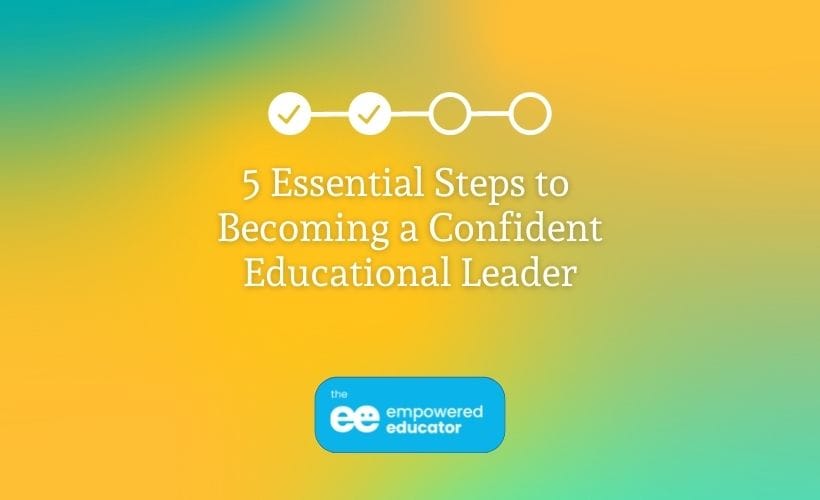
It is easy to presume that being assigned the important role of educational leader should automatically leave you feeling empowered, confident in your knowledge and skills and excited to support and guide your fellow educators in different ways…. and for many this is no doubt the case, but it’s also perfectly ok NOT to feel this way and to ask for some guidance and mentorship yourself!
If you are brand new to the Educational Leader role I encourage you to first read through this previous blog post on the role of the educational leader and what it means to be one….. then come back to this post to follow the 5 action steps below.

If you are brand new to the Educational Leader role I encourage you to first read through this previous blog post on the role of the educational leader and what it means to be one….. then come back to this post to follow the 5 action steps below.
In Part 1 of my Ed Leader Series, I shared with you 5 focus areas that I believe are beneficial for Education Leaders to start with. I gave you lots of suggestions so you could take away some ideas to try for your specific service type, region and team.
In Part 2 of my Ed Leader Series, I want to take some of those focus suggestions and show you how to now turn them into a clear action plan so we can move you closer towards being the enthusiastic, empowered and confident leader I know is already inside of you! Take what you need from this Empowered Ed series and my tips to help you continue to grow in your role…. no matter what level of experience you are starting from!
Being a leader can be tough! I have been a Leader, Coordinator, Director and Manager across both the Early Childhood and Family and community services Sectors and they all had their challenges…. every leadership role does and every leader is always learning, improving and trying new strategies and approaches so you can stop thinking it’s just you right now!
I know that clammy hands and butterfly tummy feeling when you run your first staff meeting, present a training session, attend networking meetings where you know no-one, fit in all the extra leadership paperwork on top of your usual work that still hasn’t been done and try to explain or communicate something important to someone who refuses to listen because they have been doing it that way ‘just fine’ for more years than you have been a leader!

“Every leadership role does and every leader is always learning, improving and trying new strategies and approaches so you can stop thinking it’s just you right now!”
- Jodie Clarke
Trust me, I’ve been there too... but you don’t need to give up... you just have to seek out the right information that will help you feel empowered and confident in your role rather than waiting for the support and information to come to you because unfortunately, it would seem that many early learning services at the management level are still not yet providing the support and clarification that educators in the leadership positions need to do their job well with confidence.
Some services may be confident they are indeed providing the information - but is it in a format or style that is easily understood? Does it clearly outline role expectations and key performance indicators so the leader knows what is expected before trying to carry out their role on a day to day basis?
Just as children learn at different paces and in different ways - so do adults. To ensure you have great leaders on your team - you first need to find ways to support, challenge and grow their skills. Time spent focused on this top tier in partnership with your leader will then filter down through the entire team - morale lifts, productivity lifts, people feel recognised, heard, empowered and supported as professionals and in return, the service ends up with happy children and families, less vacancies, less bitchiness and grumbling out at the sandpit (yep you heard me... I’ve been there too, don’t tell me it doesn’t happen!) less overwhelm and higher educator retention rates!
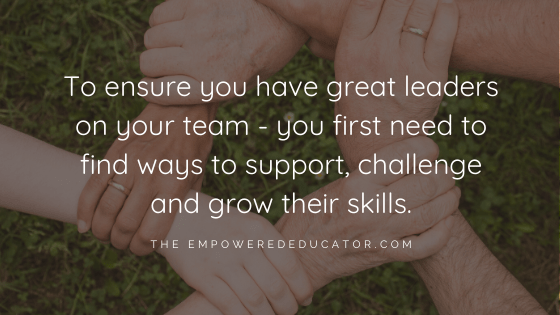
However, let’s forget about whether the service management, you as the leader or even other educators on the team are to blame for you not feeling confident in this Educational Leader role and instead take some simple yet effective steps that will have you feel like the organised and confident leader I know you want to be because you are proud of being given this role and certainly want to make the most of this opportunity by doing a good job …. you just need a little help to get there and there is nothing wrong with that!
So let’s do this together Empowered Ed’s! What do we need to do first?
Action Plan for Educational Leaders in Early Childhood Services
1. Connect through your Educational Leader Role

No matter whether you are new to the role of educational leader or have been doing it for a while now, it is important to set aside time to connect with your team of educators and also with management so you are able to collect the information you need to help you reflect, set goals, identify possible training needs, set up your own organisation and paperwork systems and better understand how to mentor and support each educator while also asking for the support you need to continue doing your own job well.
Through your own leadership style, you want to try and foster an environment and culture where everyone thinks and acts as part of one big team rather than just separate silos focused on their own grievances, frustrations, agendas, competitiveness, secrets or overall resistance to change. You want to move toward creating and sharing the big picture together - and that means laying a strong foundation of open communication and a clear message about how you will ALL move forward together as a cohesive team.
This doesn’t mean educators can’t have their own thoughts, philosophies and goals - it simply means that instead of only worrying about their own room/environments, job expectations and performance indicators or ‘planning cycle documentation’ that usually leads to educators competing for attention, training, resources, coveted early or late shift times, and a general atmosphere of distrust and ‘looking out for myself’ thinking - you instead put processes in place that foster an environment where educators can become excited and motivated to move from their separate and often isolated role to want to become part of the bigger picture and journey to get there with your leadership!
So what could this look like? What actions could you take to make this connected team approach happen?
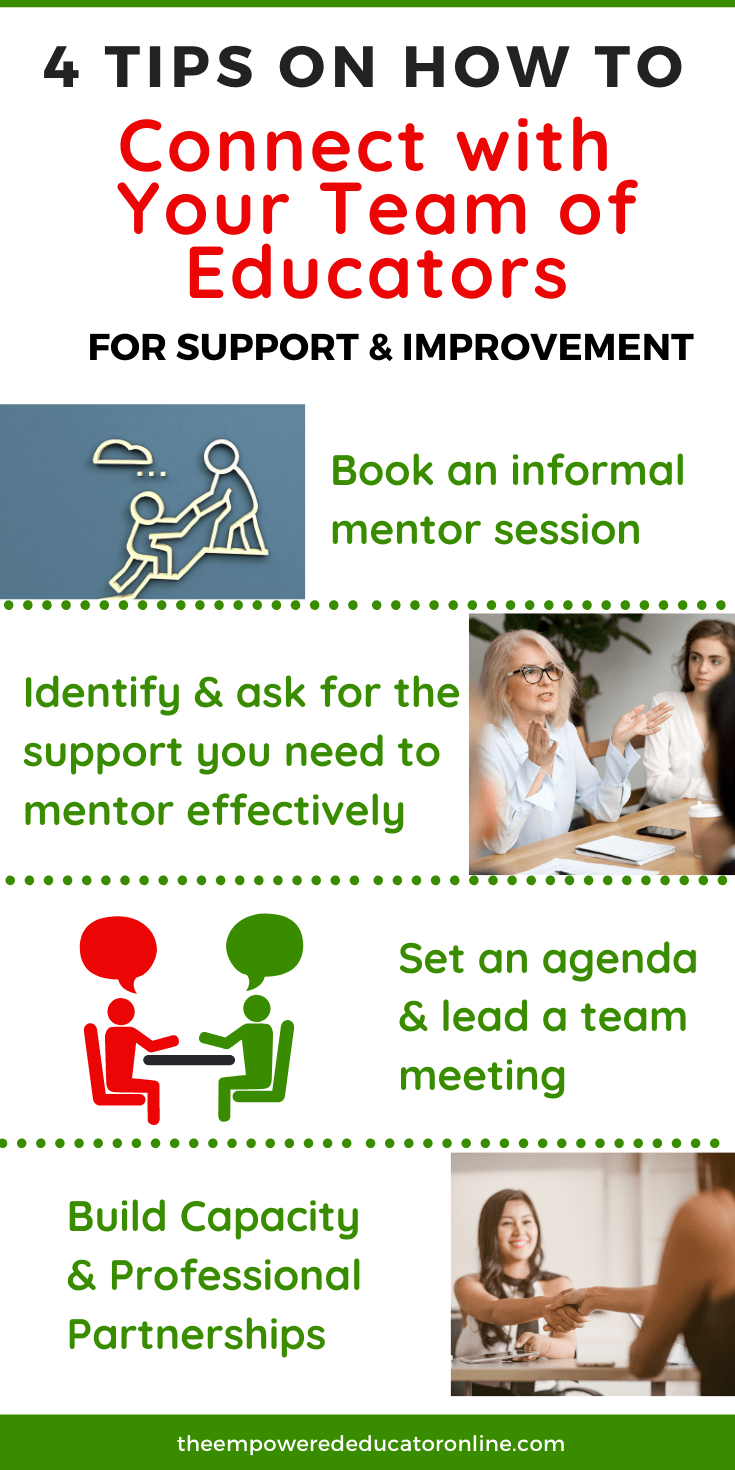
How to Connect
You first need to make the effort and time to CONNECT. Some ideas for you to start with...
1. Book an informal mentor session - Set up an individual mentor session with each educator - explain the purpose is to get to know them better, what their needs are, set goals together and to clarify their role and the expectations you have so you can ensure there is no confusion or miscommunication (miscommunication can very quickly lead to someone feeling resentful, frustrated and belligerent in the workplace so it’s important to put strategies in place right from the start making it less likely to occur). This session should be a relatively informal chat - it’s not about scribbling pages of notes and to-do lists or anything like a performance review...this should be of benefit to both educator and ed leader!
3. Set an agenda & lead a team meeting - After you have completed your mentor sessions individually, it’s time to call a staff meeting and connect with the team as a whole. If you haven’t done so already clearly explain your role, your goals, what this means moving forward together and how educators can connect and communicate with you individually and as a team or room. You will need to set an agenda and circulate a copy to everyone at least a few days before your scheduled meeting time. If you are not sure how to write up an agenda and run a meeting take a look at my Meaningful Meetings Guide here.
Empowered Ed Quick Action Tip > Have informal conversations daily - Make it a goal throughout each day to briefly catch up, acknowledge good work or show your appreciation with the educators in your team to help build strong connections and foster positive communication and team wellbeing.
2. Review in your Educational Leader Role
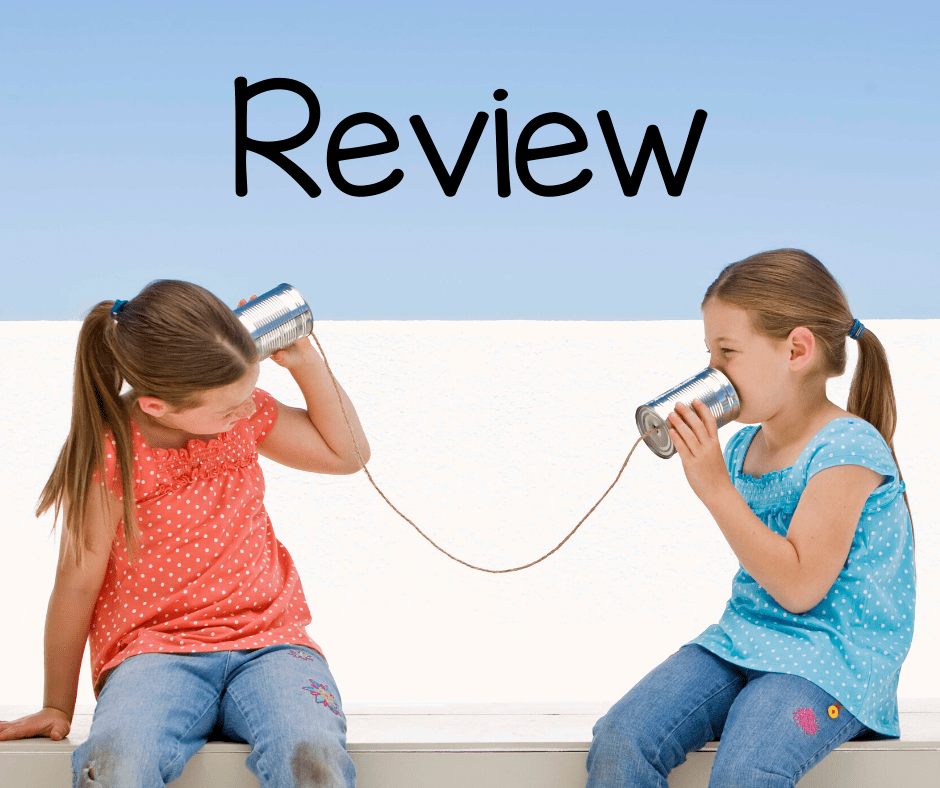
Now that you have taken some steps to connect and communicate with other educators, management and services, it’s time to review what you have learnt so far but also what areas you need to know more about as a leader.
The more information you have at your fingertips (with clear processes for seeking and receiving that information on a regular and consistent basis), the easier your job will be and the more effective leader you will become!
Some information you can find and review on your own - other important information will require a little more planning on your part and a more formal process to be put in place.
I encourage you to start with at least 2 of the following processes and actions:
Empowered Ed Quick Action Tip > Put together a folder with the essentials clearly explained in a condensed version and leave accessible in the staff room. Choose one area of this folder and ask all educators to read through this section before the next team meeting. Include a sheet they can sign to say they have read as requested.
During the next team meeting, introduce a couple of questions regarding this information to reflect on and review as a team. Note any questions asked, requests for clarification or future tasks/action steps to extend on for the next meeting.
Empowered Ed Quick Action Tip > Put in place a process to conduct regular reviews of programs and how educators are using their documentation and environments to inform their practice and meet principles and guidelines.
I’ve simplified this process for you with my Planning Cycle Review Checklists and you can grab a free sample from the checklists below but you could also write and set your own version up in a hard copy folder if you prefer.
If you don’t want to do a hard copy format make sure you at least have access to a tablet or laptop you can use during the review so you can both be adding information as needed rather than relying on your memory and the next time you have a minute to write something down!
3. PLAN in your Educational Leader Role
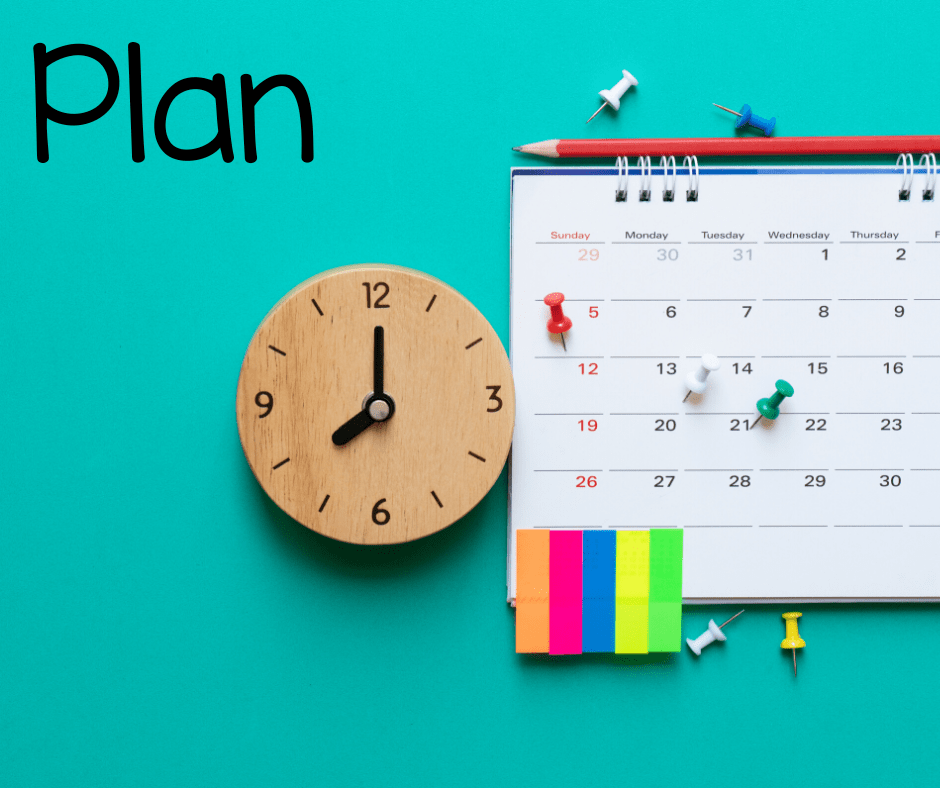
So you have connected and reviewed and put some processes in place - what next?
How else can you use this information you are collecting and reviewing on a consistent basis to further support and empower the educators on your team and also help you to keep growing in your educational leader role?
If you have an Ed leader journal, diary or folder (even if digital) this is where you want to record this information so you can easily take it with you from room to room or meeting to meeting without needing all the other bits and pieces that go into more depth on specific areas like the planning cycle reviews or meeting notes and agendas.
Think of your leader journal/folder as a tool to keep all of your thoughts, reflections, quick notes, conversations, goals, networking events, research links and professional development ideas together in the one place. This not only helps you feel organised but also less overwhelmed because you are focusing on the important information and goals you have set weekly and monthly rather than feeling like you are on a constant information treadmill with a to-do list that never gets done!
Use your journal to highlight focus areas, pull information together in summary form and plan ahead - you might include some of the following:
Empowered Ed Quick Action Tip > Print out pages from the Empowered Ed Leader Journal and place in a folder (or use on your device and save in the cloud for access everywhere). Look at the weekly action guide section and take 5 minutes to fill it in every Friday afternoon before you leave work or early before work Monday morning.
If you don’t have the Ed Leader journal
4. Prepare & Organise in your Educational Leader Role

Planning leads us to organisation and even though some of the actions in section 3 above should have you feeling more prepared there are some other essentials to consider if you want to manage your time effectively and fit in all of your additional leader tasks on top of your regular educator expectations without feeling too stretched.
By taking extra time to reflect on and put in place strategies and processes for common focus areas initially you will save a lot of time (and repeated conversations) in the months to come, so it is worth the extra effort at the beginning.
Consider what is already in place and what information or support you feel would be useful to introduce or setup from the following suggestions:
Empowered Ed Quick Action Tip > Set up all the files and folders you will need to cover all the steps we have been discussing throughout this blog post before you do anything else as this will save you valuable time as you check off all areas of your role confidently and also help you to effectively show examples and explain requirements to other educators. Review, add or combine files as you need to on a regular basis.
"Lead and mentor by example with your own organisation and time management."
theempowerededucatoronline.com

5. Take Action in your Educational Leader Role

All of the steps above require some action on your part so why have I included ‘take action’ as a separate category?
Because we often need a bit of a not so subtle nudge and some quick, achievable action steps right in front of us before we will take action and overcome our procrastination instinct! I’m pretty sure it’s not just me... right?
So I’m going to give you some simple action motivators and I want you to choose at least 3 then come back and comment below with what you have been able to check off!
Being a leader isn’t easy, but when you have steps to follow, goals set to work towards and the resources and training you require to support you in your role - it can be a wonderfully challenging and empowering role to be in.
Forget about perfection and just be you… that’s what got you the job in the first place remember! 🙂
Make sure to pin this article so you can find it again and use for your ongoing reflection and empowerment.


A Little About Me

Jodie Clarke is an early childhood professional supporting educators who want and need to stay passionate about the work they do! She has 30 years hands-on experience in the early childhood and human services sectors across many different roles.
Jodie is mum to 3 in Australia and has already helped thousands of educators with their work through her popular blog posts, activity ideas, online training and e-books.

Leave a Reply